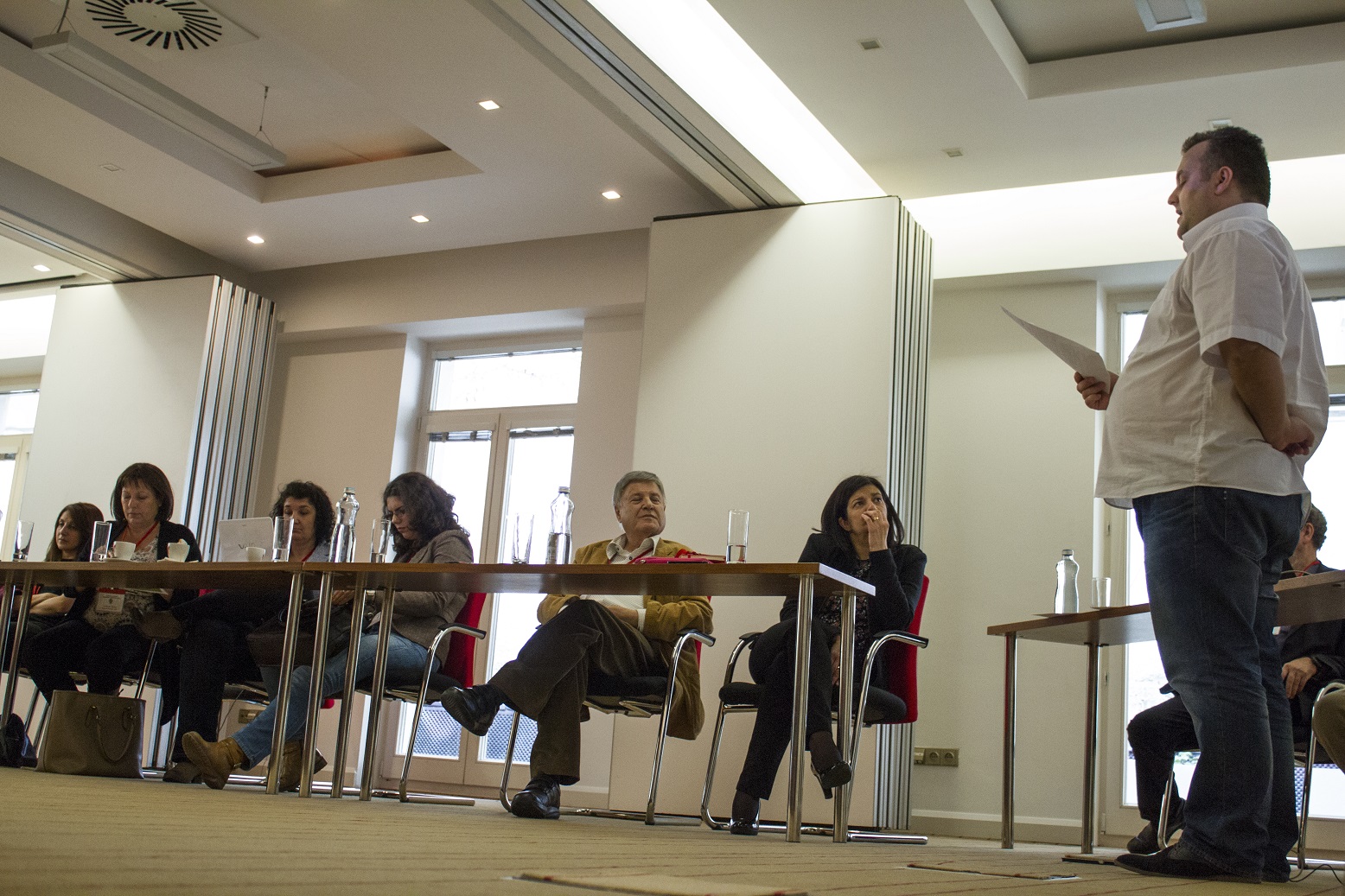Mental Health and Migration
‘Bringing down the barriers’
19 – 20 March 2016
Summary report
Thematic seminar organised in Prague (Czech Republic)
Aim of the seminar was to address the impact of the current migration crisis on mental health, with participants reflecting and reporting on:
- the situation in their country
- how patient advocacy groups are involved
- good practices in their country
Saturday 19 March 2016
Opening Session
Yoram Cohen (President) welcomed all participants to the seminar. After a short tour de table in which all participants briefly introduced themselves he gave the floor to key note speaker Katrine Camilleri (Director of the Jesuit Refugee Services, Malta).
Katrine provided detailed background information on the situation in Malta, which finds itself in the middle of the central Mediterranean route – one of the main routes for irregular entry into Europe. Malta has seen a steady increase in the number of people arriving by boat, and these boat migrants have special needs. In other European countries the rise in the number of asylum seekers has led to a sort of panic mode, with unilateral action (such as building fences) as a result. There are challenges on many levels, related to how we receive these asylum seekers and how we respond to them. The EU response is raising questions, as fear motivates this response; and fear is not a good leader.
We must not lose sight of the real cost in terms of the fatalities and lives lost at sea, the loss, despair, anguish and pain – the need for help and support cannot be questioned. People crossing land borders face other costs as all routes are risky; many suffer persecution and rights violation. People smugglers, in many cases, abuse their position of power; they extort, rape and torture. And when refugees are being detained in the countries of transit, the conditions are horrible. In the destination countries, the situation often is not better.
After detention, the impact of social exclusion and inability to build your life takes its toll. Refugees want to be safe, but they also want the possibility of building a life, to belong somewhere, and ensure better lives for their children. So, across the EU, we are failing people – we exclude them.
In relation to the specific services relating to mental health, Katrine’s organisation notes that in many cases, mental health of the refugees is affected by the totality of their experiences – war and persecution in their country of origin, torture, imprisonment, the terrors along the traveling route as well as the experiences after their arrival in Malta, where they do not have hope for a future. Access to health care and quality of care needs to be improved. Responses and solutions which take actual account of personal needs are required as a matter of urgency.
Following Katrine Camilleri, Tereza Nus (KOLUMBUS) read out two messages: one from Miluse Horska (Vice-President of the Senate) and Lenka Ptáčková Melicharová (Deputy Minister for Health Strategy), both expressing their support for the seminar and wishing GAMIAN-Europe well in their efforts to advocate for recognition of the importance to address mental health and put in place appropriate services for those affected by mental health issues.
The next speaker was Tomas Zdechovsky MEP, who expressed his concern and interest in the topic of mental health, most particularly in relation to migrants and refugees. He underlined the vulnerability of refugees to stress, anxiety and Post Traumatic Stress Syndrome and expressed his strong interest in working with GAMIAN-Europe to raise awareness in the European Parliament of this specific issue, for instance by means of tabling a Written Declaration. All too often, it is forgotten that we are talking about people, and the traumas these people have endured are not talked about at all. With his background as a street worker working with Roma, Tomas Zdechovsky is well aware of the problems and is determined to make sure that there is attention for these traumas. After all that people have endured along the way, the second traumatisation occurs when there is no perspective in the arrival country. A strategy is needed now as immigration is going to be a sustained problem.
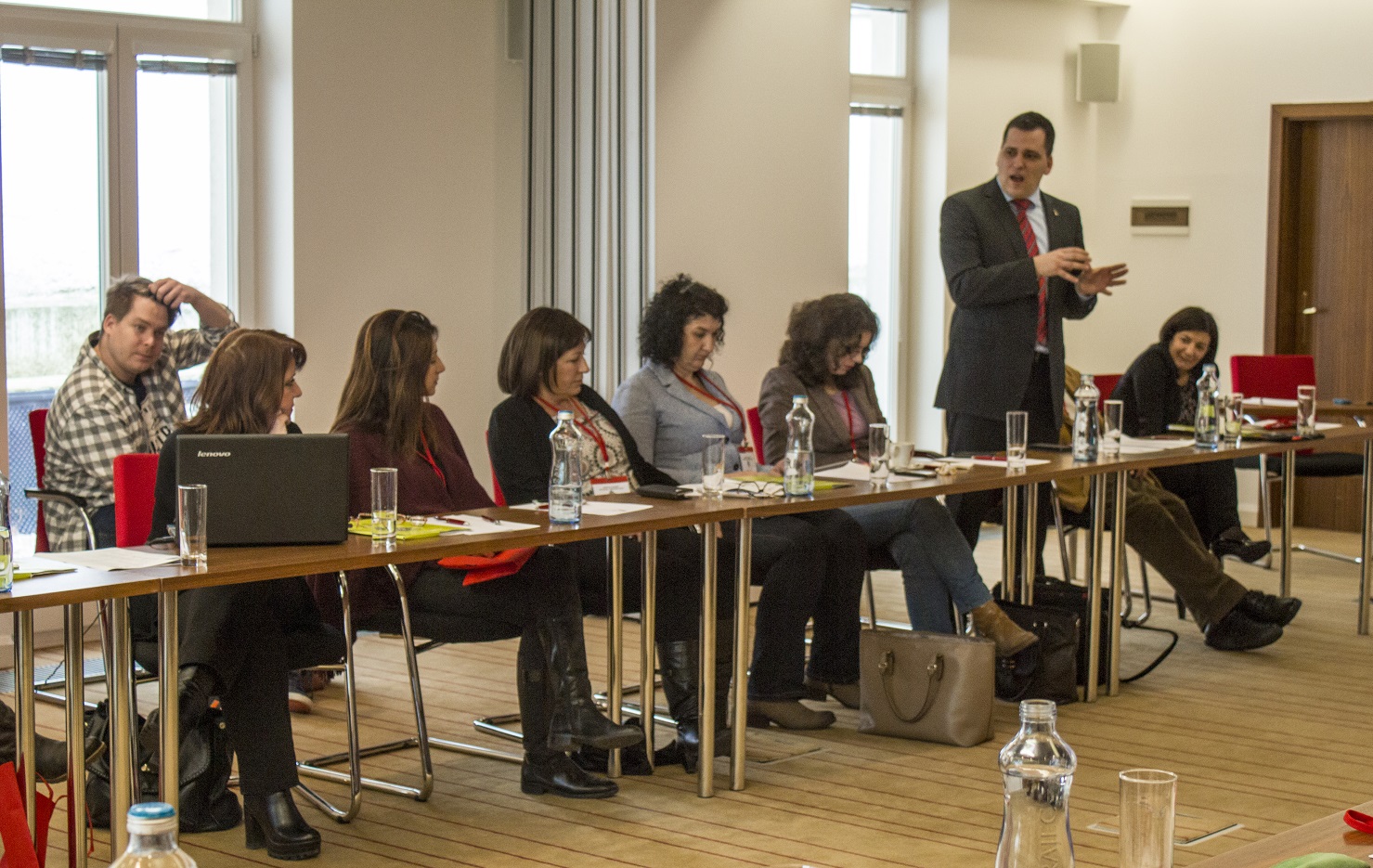
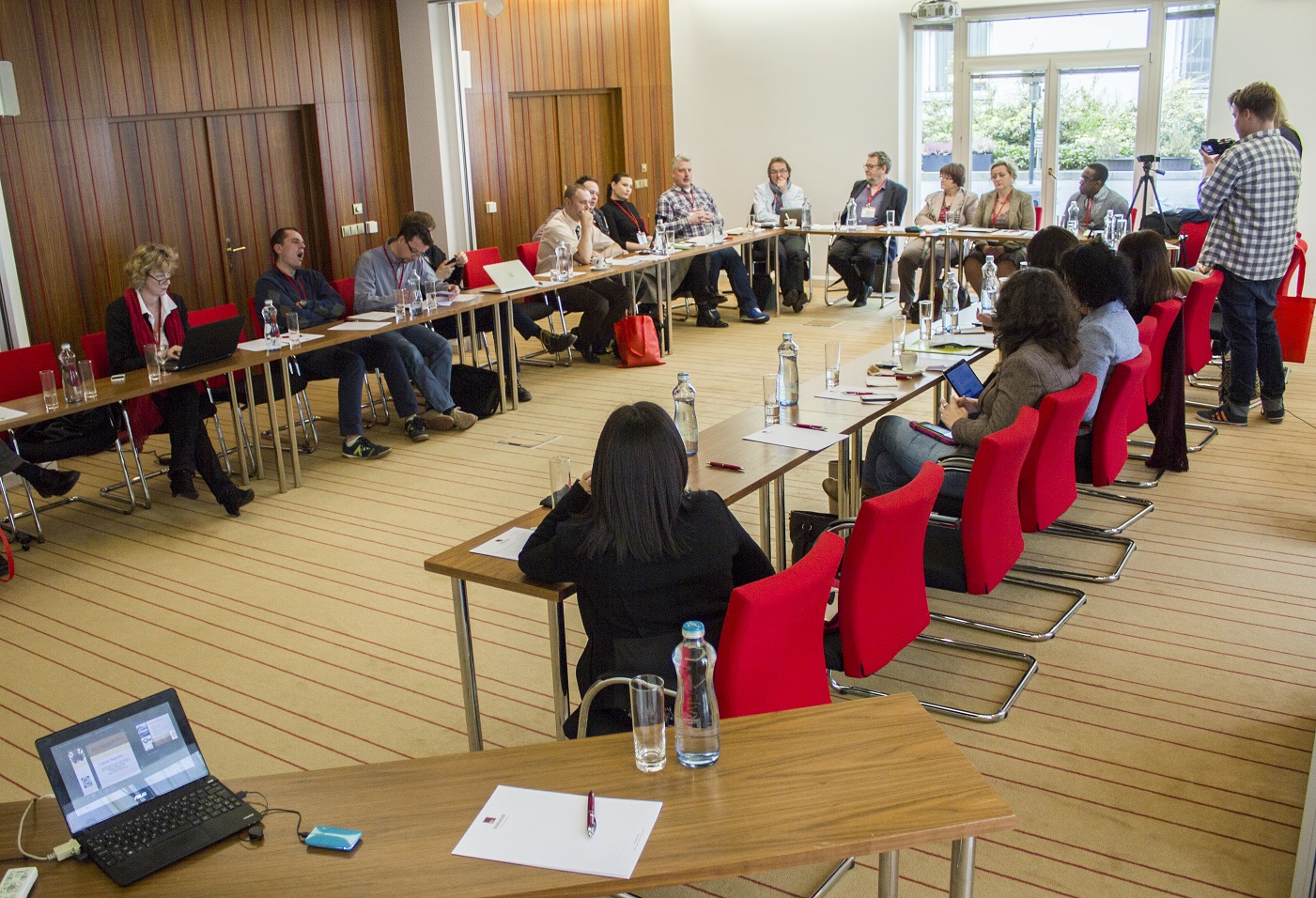
All too often, it is forgotten that we are talking about people, and the traumas these people have endured are not talked about at all.
Session 2: Countries reflecting on the situation/development in their country
Czech Republic: Daniel Czernik presented the situation in his country, where strong voices against refugees can be heard. For instance, a recent demonstration in front of Prague castle brought together some 10 000 people demonstrating against refugees. Daniel attended this demonstration in order to prepare for the GAMIAN-seminar, wanting to hear different opinions about the situation in Czech Republic. On the occasion of the demonstration, most participants were neo-nazis or came from similar type parties. They want to protect the borders and to protect the state; they are generally against the EU. Participants also strongly criticised Angela Merkel´s politics concerning refugees in Europe. The demonstration was broadcasted in four other European states.
There is a refugee camp in Bělá pod Bezdězem, where 9 refugees with their children are living. The living conditions are good and people are protected.
There are not many refugees in the Czech Republic as most refugees are more interested in countries like Germany or the UK. But after Germany closes their borders they might arrive in the Czech Republic as well as this countries should take up 3, 500 refugees, according to the recent EU agreements. Many refugees have health problems and problems with visa; and there is widespread fear that there are terrorists amongst them.
Daniel works as a social worker and personal assistant and supports mentally ill people and disabled people. He would certainly help refugees if he would meet them in the street or in the psychiatric clinic where he works. Maybe the problem with refugees should be solved in Syria or Turkey – but that is easy to say.
The KOLUMBUS help line has received calls from patients who are afraid because of the migrant’s crisis – so the current situation has an impact on patients. Refugees themselves have not made use of this facility yet.
Slovakia: Marcella Barova presented the situation in Slovakia. She started by presenting her organisation, ODOS, which focuses on themes like stigmatisation of mental health, improving the quality of life of patients and social integration. Patient advocacy and education of patients and family members are also very important.
Stigma reflects a lack of knowledge as well as a problem of attitude. A survey, carried out by ODOS, pointed out that it is difficult to live with mental illness in families and the workplace as some 98 % experience stigma; families experience shame and do not dare to speak openly about their experiences. ODOS produces information leaflets, communicates with the media and offers direct support to families. The organisation is also involved with an EU funded education project about patients in hospital – Mental Health Europe is also participating.
ODOS also works with the National Council of Disabled People as the majority of people with mental disorders are disabled.
The next Slovakian speaker, Dagmar Breznošcáková, explained that in her country, a variety of different authorities are involved with the migration authority. Some psychological assistance is offered to asylum seekers but this is very limited. Specific project helping asylum seekers exists, with some 7 organisations involved, including the Human Rights Council of which ODOS is a part. The number of refugees applying for residence is very limited – most want to get to the West.
Slovenia: Dimitrij Marusic presented the situation in Slovenia and his organisation, OZARA Slovenija Nacionalno. This offers different forms of psychosocial rehabilitation and support to people with mental health problems. Main programmes focus on counselling, residential groups and day centres. Prevention is another focus point. In Slovenia, non-governmental and humanitarian organisations are actively involved in providing assistance to refugees. SLOGA, a platform of non-governmental organisations, is coordinating NGO activities and humanitarian organisations, while Slovene Philanthropy is coordinating the collection of individual’s contributions.
More than 2000 volunteers joined Slovene Philanthropy to help refugees on their way through Slovenia. Last autumn, Slovenia faced an unprecedented influx of refugees. At first, the Slovenian authorities planned to treat the migrants according to standard border control protocols. Those simply using Slovenia as a “transit country” to get to Western Europe would be denied entry and returned to neighbouring Croatia. Between October 2015 and January 2016, 419,205 migrants crossed through Slovenia using this corridor; only about 100 applied for asylum in Slovenia. Normally, these migrants would have to apply for a visa to legally enter Slovenia; but if they use this irregular way of travelling, they can pass through Slovenia without documentation. Instead, some are issued a document called “permission to remain” which is granted to individuals who do not have the right to asylum, but also cannot return to their countries. This document protects from expulsion individuals who are likely to stay in Slovenia for a while without any particular legal status. But it does not apply to migrants and refugees in the corridor, whose only intention—as well as that of the state—is to leave the Slovenian territory as soon as possible.
This unusual scenario is unfolding against a backdrop in which racist, xenophobic, and Islamophobic sentiment is on the rise. Prejudice against ethnic and religious minorities runs deep. Without a coordinated
European response Slovenia will continue to resort to unilateral measures aimed at making their territories inaccessible – contrary to pledges given when joining international human rights treaties.
Hungary: Istvan Gallai presented his personal opinions on migration and the current crisis as well as those collected from two ‘Hearing Voices’ Self-help Groups. These show the good and the bad side of migration.
The first item related to facts, feelings and reactions concerning the migrants. Istvan himself has empathy and feels sorry for these refugees; he would like to help them as it is a tragedy for them (and also for us). As a general rule they are not terrorists. For patients (who are sensitive people) this situation increases their distress. But as they know from experience what it feels like to be defenseless, they also have more empathy. The self-helpgroup response was mixed: there were some positive opinions but they are mostly negative ones, expressing fear and insecurity but also some empathy.
The second item related to facts, feelings and reactions concerning the Hungarian people. Istvan himself faces a dilemma as he is worried about the effect of the migration on Hungary; he feels fear and doubt about dealing with potential terrorists, the effect on the society and on the patients, the effect of closing borders and questions about whether refugees are exploiting the Hungarians. But he does feel Hungary can accommodate 1294 people, as agreed at EU level. The self-helpgroups also expressed a variety of feelings, mostly related to pessimism, fear and hopelessness.
The third item related to facts, feelings and reactions concerning Europe. Istvan again faces a dilemma and fears concerning the EU. There is no shared point of view, no common approach. Maybe there are too many refugees for the EU but we have to help Greece and Italy as well. The self-help group also expressed pessimism and criticism.
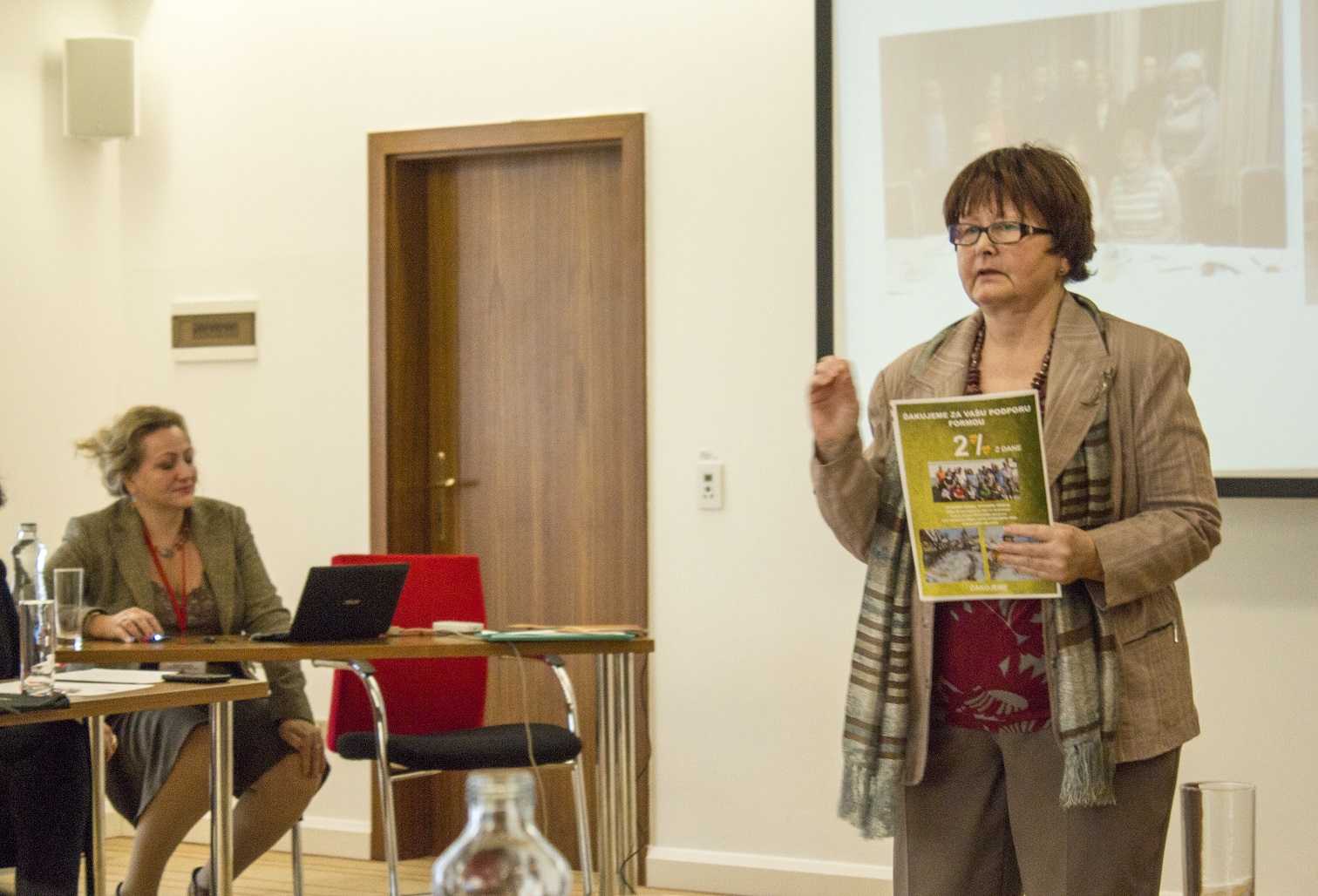
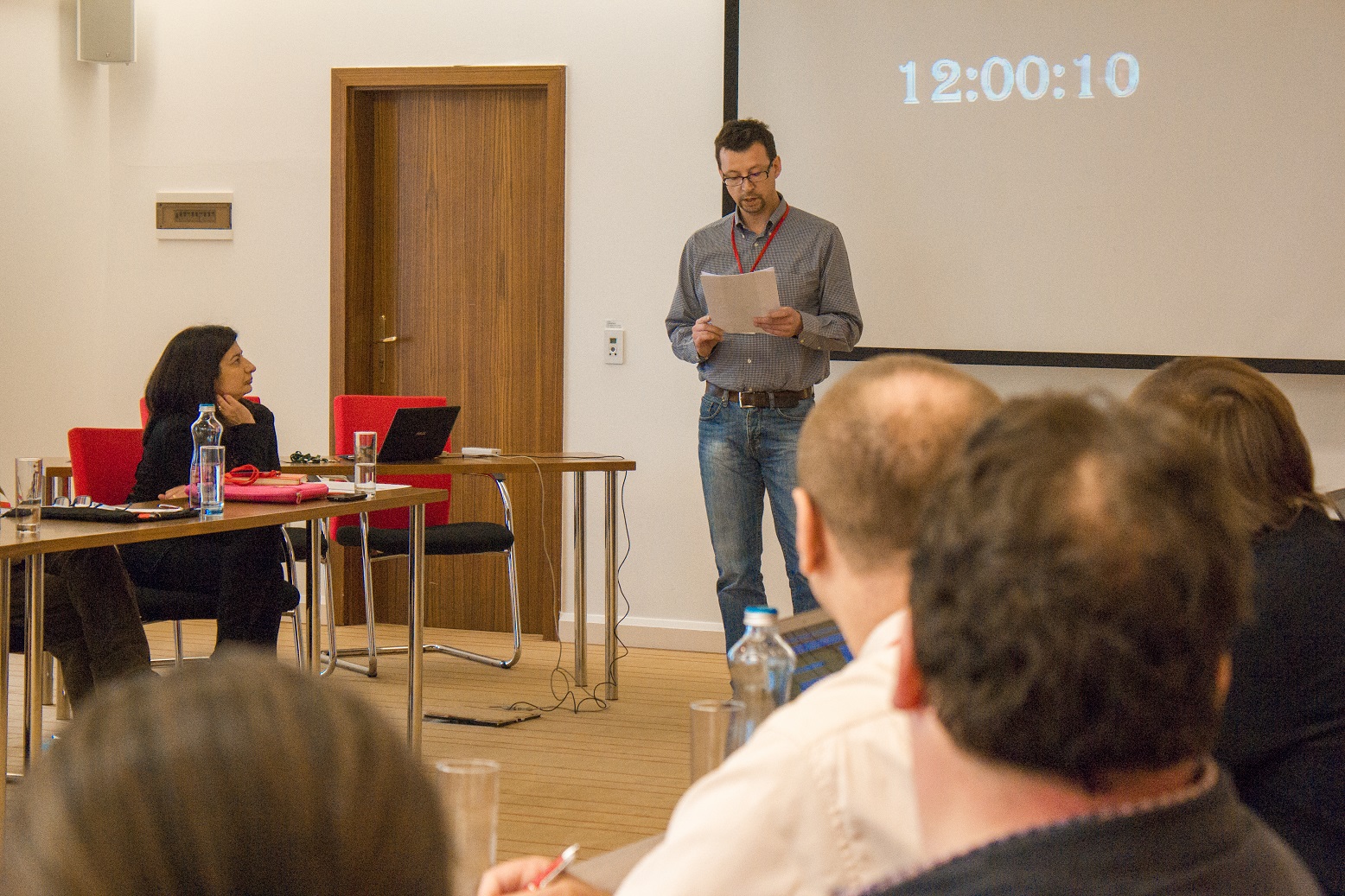
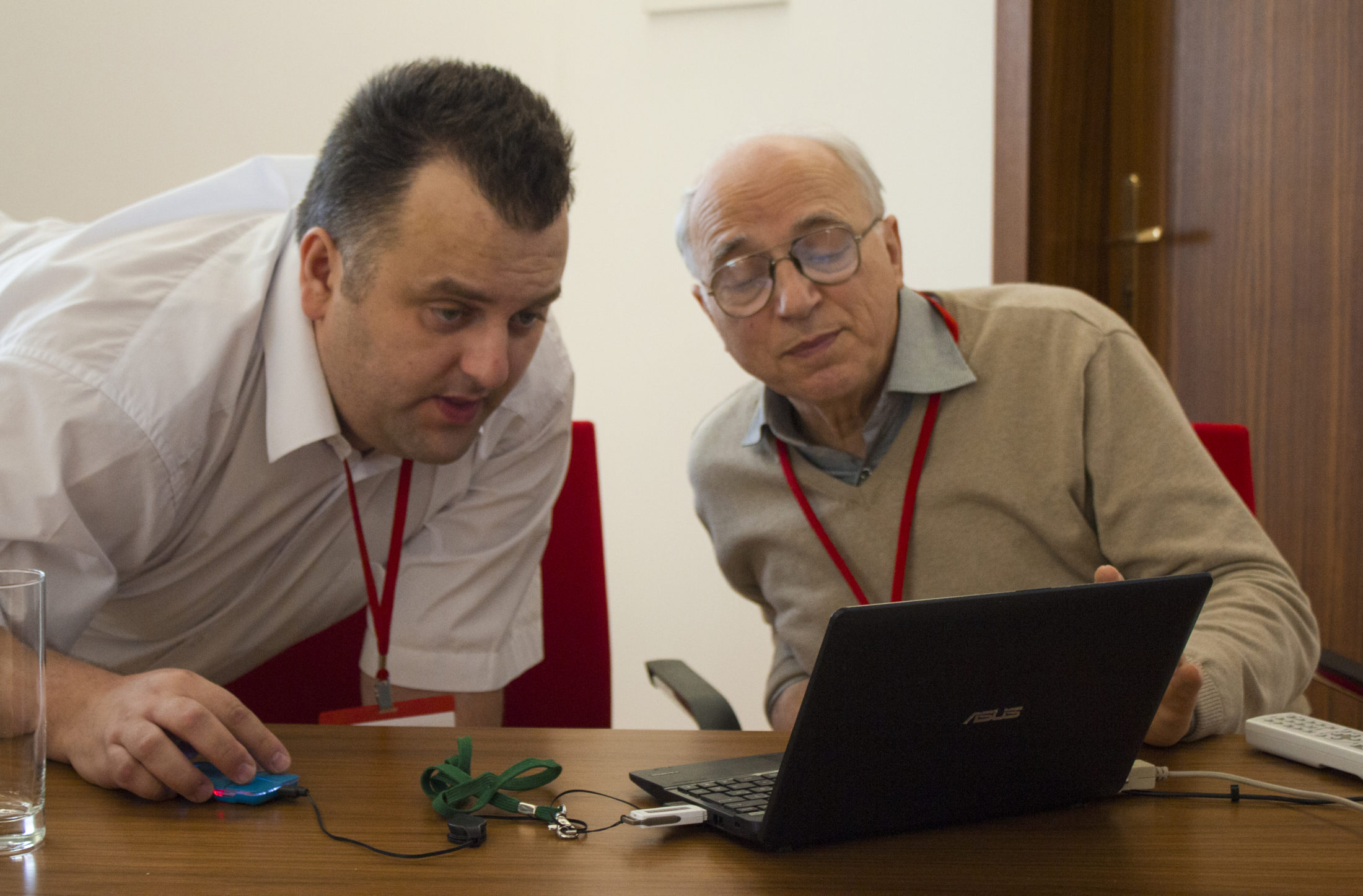
Afternoon session
Greece: after briefly introducing his organisation, Kinapsy (supporting people affected by mental health and their families and carers), Evangelos Asprogerakas provided information on the situation in Greece. Most of the people coming into Greece via Turkey are refugees, and some are immigrants (for economic reasons). They are exhausted, traumatised and without money because of smugglers and extortion by people in the transition countries. The Greek government confronted this issue and is building little houses for the refugees; some 20 houses are built each day. However, this is by no means sufficient for the vast numbers of people coming into Greece (on average 1500 a day). These houses are built with Greek money; the EU did not contribute and other countries did not respond to Greece’s call for help. There is a huge difference between the ways Greece and Turkey are treating the refugees; many Greeks are extremely helpful.
Clearly, our society is in crisis as we are not ready for this amount of people. The EU agreements with respect to each country taking in a certain number of refugees are not being respected.
Evangelos showed some videos to underline the hardship of the refugees.
Malta: Daniella Calleja Bitar described the situation in Malta. There is only one mental health hospital in Malta where refugees from the detention centres get transferred to in case of attempted suicide.
It is clear that the mental health of refugees deteriorates as a result of their experiences during the journey and upon arrival. Daniella showed pictures of the mental health hospital which looked quite awful – not much better than the actual detention camp. A comprehensive report on the conditions faced has been prepared on ‘Care in captivity’ and one of the striking findings was that the camp was actually better than the hospital. However, the ward is being improved.
One of the ongoing projects in Malta relates to the provision of mental health first aid: it is now possible to train and get a license as a mental health first aider. This focuses on a number of mental health conditions, and migrants themselves are being trained as well. The programme needs to be adapted to national culture but has great potential for wide dissemination. Daniella showed an interesting video on this project and underlined that psychological first aid will be the theme for this year’s Mental Health Day.
In short, efforts are being made to accommodate the refugees. To include psychological support is not easy but recognising the first symptoms of mental health conditions is already a useful start.
Romania: Raluca Nica and Maria Mitica provided information on the situation in Romania, showing some strong images of refugees in inappropriate boats. Children are obviously the most affected, and these children will bear this trauma throughout their lives; they are at risk of serious mental health problems later in life. The rejection by many countries is dramatic, taking into account the 4 million which are on the border with Syria. The deal with Turkey might bring a new type of migration with free movement. Migration is here to stay and will be here tomorrow – and it should be seen as a problem of all of us rather than as a problem of ‘us and them’.
It is a new phenomenon for many countries and brings insecurity and fear. How can we get over this fear? In many cases, it is not so much the problem of immigration but of politics of the right and left – and the issue is also used to gain votes. The media is playing a negative role as well. Fear should be based on reality rather than on scaremongering. But the media and politicians are modelling the reality. Dignity and equality should be the key words and this is what GAMIAN-Europe is about.
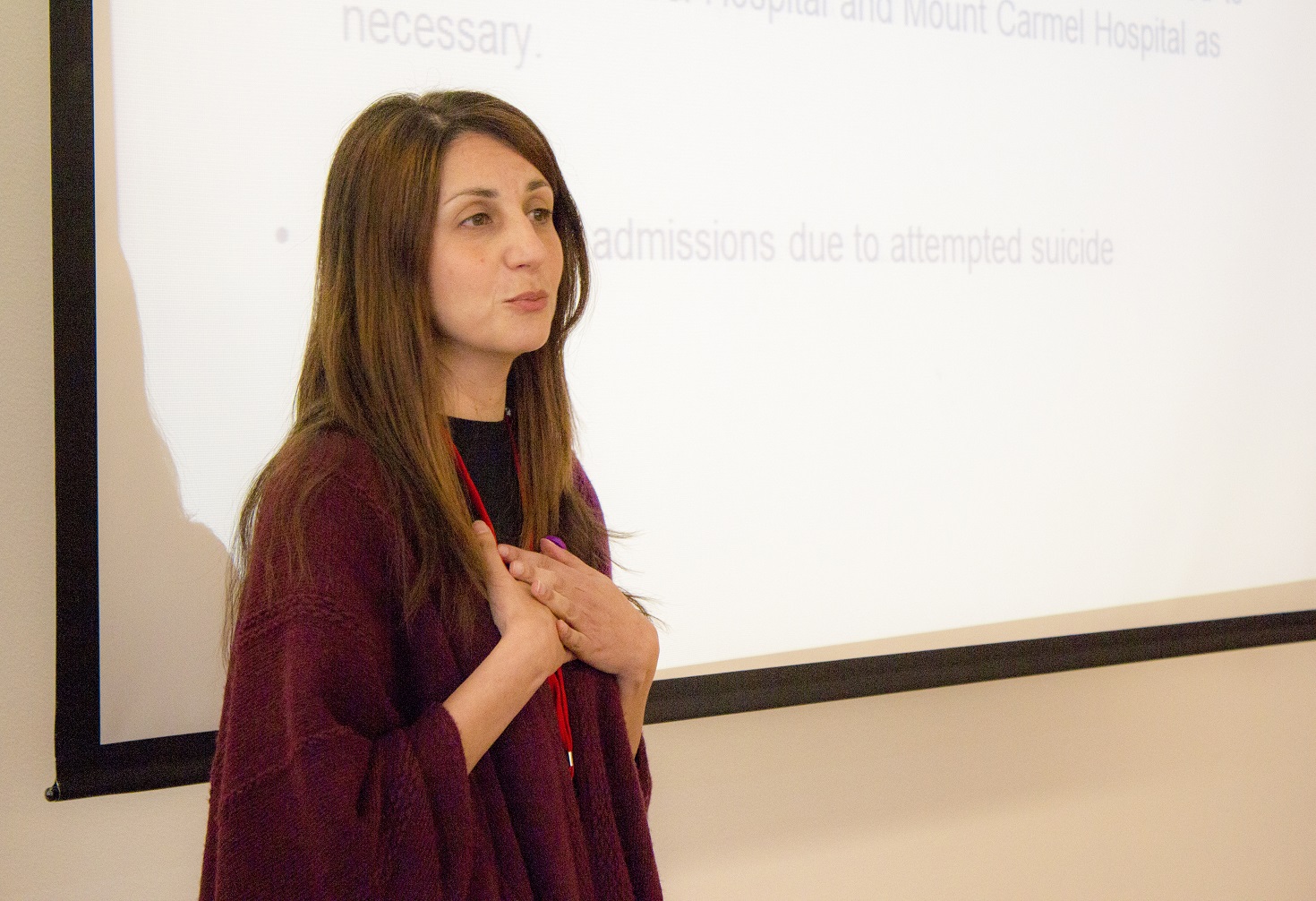
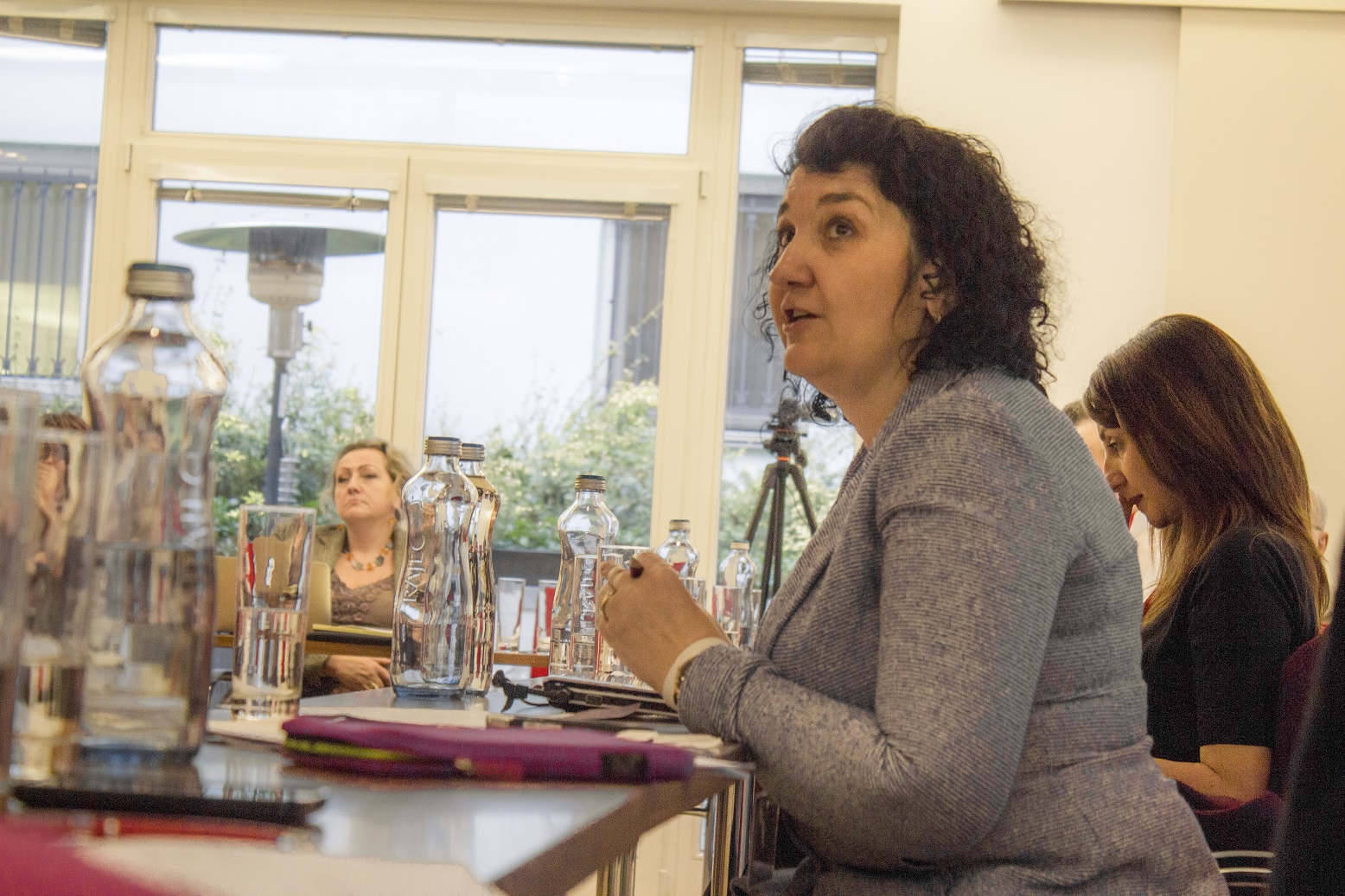
Sunday 20 March 2016
The second day of the seminar focused on good practice in the field of mental health in their countries.
Istvan Gallai (Hungary) presented the work of self-help groups i.e. the ‘Hearing Voices’ groups. This is a new method of addressing schizophrenia, which largely focuses on peer support. The groups meets every second week, and members are invited to share their experiences of the past two weeks. These true stories inspire hope in fellow-patients. The groups are also actively addressing the voices heard by patients: by means of questionnaires and an interview the voices heard by participants are being analysed and dealt with.
The questionnaire is meant to be filled out when a voice is being heard, making more specific when the voice appears and what it entails. Istvan stated that the work in the groups is good for the body (as participants are advised to exercise) as well as good for the soul (by reading books). And engaging with good practice is good for the spirit. The meaning of the voices is analysed and patients are trained to communicate with them. Patients – as experts by experience – are being trained, working alongside psychiatrist and psychologists, on how to run these self-help groups and on how to diagnose and recognise the symptoms of mental distress.
Istvan’s personal experience with the groups is very positive: his mental health has improved, he takes more responsibility, cares more for others and feels richer emotionally. The ‘Hearing Voices’ method merits greater awareness and dissemination.
Also from Hungary, Merey Zsolt provided information on the state of psychiatry in his country.
The Mental Health Integration Index (February 2015) ranks Hungary as number 25 out of the 30 countries surveyed; there is a lack of long-term policy and low numbers of mental health professionals. However, some social services are excellent.
The field of community psychiatry is still largely non-existent, despite social services being open to new methods in psycho-social rehabilitation. Due to advocacy by the Awakening Foundation, a new law on disabled persons now includes users with mental health problems. Social services strongly support the idea of sheltered housing for users with mental problems in order to close large mental health institutions. The Hearing Voices approach, as explained by Istvan, can be applied by all those involved with community psychiatry including relatives and friends.
The Awakenings Foundation in Budapest has recently introduced Individual Trauma Therapy based on psychotherapy, on the basis of the Hearing Voices approach and community psychiatry practice.
The Hearing Voices approach, however, proves to be a challenge for traditional psychiatry, as the latter does not engage in studying voices nor does it believe in the possibility of recovery. The Hearing Voices approach is as a recovery based approach, building on the personal resources of users and their families.
Another positive development was the first Credit Point Seminar, held in Hungary for experts by accompaniment and by experience. The aim here is to seek job opportunities for the new experts by experience. Lastly, Merey referred to the publication of a booklet on the Hearing Voices approach with the personal contributions of two experts by experience
Final session
During the final session participants were asked about their opinions of the seminar. All replied in a positive sense, having enjoyed sharing experiences and thoughts with like-minded individuals and organisations, and all expressed an interest in further cooperation on the topic of mental health and asylum seekers and other mental health issues, such as stigma.
Report by Christine Marking
